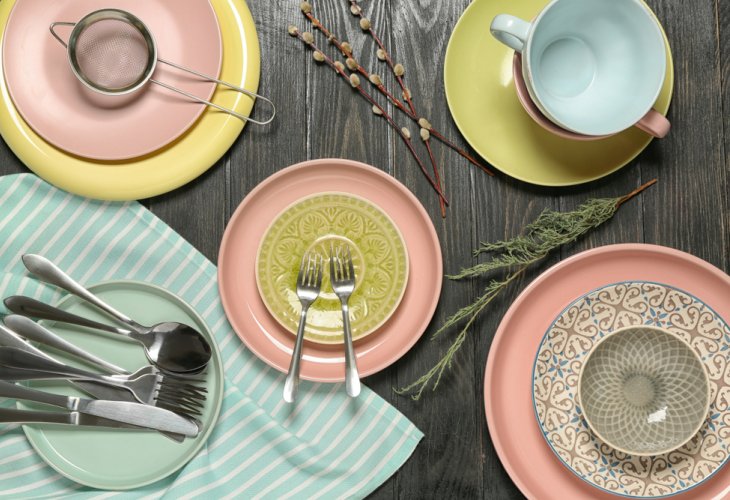Beginners Guide
Growing Spiritually and Keeping Kosher? This Might Be What You (Possibly) Forgot
Why is it necessary to immerse utensils? Does it really affect our soul?
 (Photo: shutterstock)
(Photo: shutterstock)Eating is not just a physical act of nourishing the body; it also has a spiritual dimension that affects a person’s soul. Therefore, there are numerous kashrut laws, as well as blessings that must be recited before and after eating.
Those who are strengthening their observance may not always be aware of the laws of immersion of utensils. Utensils produced by or purchased from a non-Jew (such as from a non-Jewish-owned factory) require immersion in a 'mikveh (body of water) for utensils.' Immersion in the mikveh purifies the utensils, removes their ritual impurity, and sanctifies them for use by the Jewish people.
The source for immersing utensils is found in the Book of Numbers, Chapter 31, verses 21-23: "Then Eleazar the priest said to the soldiers who had gone into battle, 'This is what the law that Hashem commanded Moses is: gold, silver, bronze, iron, tin, lead and anything else that can withstand fire must be put through fire, and then it will be ceremonially clean. But it must also be purified with the water of cleansing. And whatever cannot withstand fire must be put through water'." Eleazar conveyed this command on behalf of Hashem after the battle with Midian, when Israel took Midian's utensils among the spoils of war, thereby deriving the laws of immersion for utensils taken from non-Jewish ownership to be transferred to Jewish ownership.
What is special about the mikveh water? Is there a difference between mikveh water and the water that flows from the tap in our homes?
Although tap water and mikveh water may look outwardly identical, spiritually, they are entirely different. The purpose of immersing utensils in a mikveh is not for washing and cleanliness. The immersion in a mikveh is purely spiritual and intended for purification. Mikveh water is derived from rainwater that is not disconnected from the ground or is connected to the ground (by touching), and thus it is called "living water" capable of purifying. In contrast, tap water is disconnected and lacks this spiritual purifying quality.
One of the steps in the conversion process for a non-Jew is to immerse in a mikveh for purification. This immersion changes the spiritual nature of the person immersing. Similarly, utensils made by or acquired from non-Jews need to undergo a purification process to be kosher for use by Jews.
The utensils that require immersion include glass, Duralex, Pyrex, and metal items that come into contact with food, such as plates, cups, cutlery, serving bowls, bottles, storage containers and jars, trays, pots and pans, kitchen utensils, cooking and baking equipment (like ladles, graters, parts of mixers that touch food like whisks), and more. Porcelain items, including porcelain coated with glass, are usually immersed without a blessing due to uncertainty. Notably, there are utensils from Israeli chains that are imported from abroad (made in China), and thus manufactured by non-Jews.
A factory owned by a Jew with non-Jewish workers, or vice versa, requires immersion of its utensils, preferably without a blessing. Conversely, utensils from a factory owned jointly by a Jew and a non-Jew do not require immersion, though some opinions advocate immersing without a blessing.
Earthenware, porcelain, and ceramics without a glass coating, as well as stone, wood, paper, and nylon utensils, do not require immersion. It has become customary not to immerse plastic utensils, and those who immerse them without a blessing will be blessed.
Before immersion, the utensils must be clean and free from barriers such as stickers or labels, allowing the utensil to be surrounded on all sides by the purifying water, without any obstructions.
Blessing for Immersing Utensils
Before immersing a single utensil, recite the blessing::
"Baruch Atah Hashem, Elokeinu Melech Ha'Olam, Asher Kid'shanu B'mitzvotav V'tzivanu Al Tvilat Keli".
Before immersing multiple utensils, recite the blessing::
"Baruch Atah Hashem, Elokeinu Melech Ha'Olam, Asher Kid'shanu B'mitzvotav V'tzivanu Al Tvilat Kelim".
The Weekly Challenge
Have you used your kitchen utensils for many years and never immersed them? Take some time this week for a small project of immersing your kitchen utensils.
Read also:
Which utensils require immersion?
Immersion of Utensils: Facts, Laws, Explanations, and Videos on the Mitzvah of Immersing Utensils

